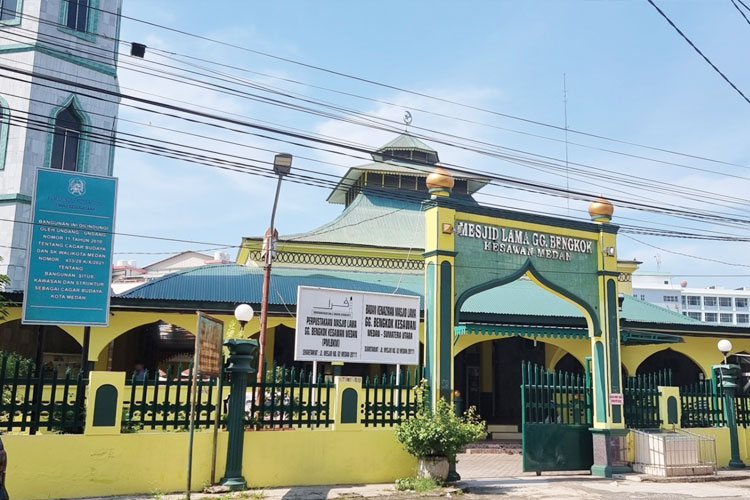
TIMESINDONESIA, MEDAN – Masjid Bengkok, colloquially known as the "Bent Mosque," stands proudly amidst the bustling streets of Medan, a city renowned for its rich cultural tapestry. Located in Gang Bengkok, Jalan Masjid, this iconic place of worship holds a significant place in the hearts of Medan's residents and visitors alike.
Finding Masjid Bengkok, also referred to as Masjid Lama in the Kesawan sub-district of West Medan, is an endeavor filled with historical and cultural significance. Situated in the heart of Medan, often dubbed the "Paris Van Sumatera," the mosque's surroundings buzz with activity, serving as a hub for trade in motorcycle parts, office supplies, and printing services, predominantly managed by Chinese merchants.
Advertisement
Despite its commercial vibrancy, Masjid Bengkok remains a sanctified space for spiritual solace and communal gatherings. It's not uncommon to witness individuals from outside Medan or even from distant provinces of North Sumatra offering prayers at Masjid Bengkok while engaging in commercial activities in the vicinity. Moreover, Muslim workers in the area frequently congregate for congregational prayers, fostering a sense of unity and belonging.
The roots of Masjid Bengkok run deep into the annals of Medan's history, bearing witness to the city's colonial past under Dutch rule, the tumultuous period of Japanese occupation, and the eventual dawn of Indonesia's independence on August 17, 1945. Situated in the heart of the city's historic district, Masjid Bengkok serves as a tangible link to Medan's bygone eras, preserving tales of resilience and fortitude.
Masjid Bengkok owes its inception to the visionary endeavors of Tjong A Fie, a Chinese immigrant who arrived in Tanah Deli during the 19th century. Despite humble beginnings, Tjong A Fie's entrepreneurial acumen propelled him to prominence, eventually becoming the first Chinese individual to own vast tobacco plantations in Deli. As a testament to his gratitude and reverence, Tjong A Fie sought permission from the Sultan to construct a mosque, recognizing the Muslim community's need for a place of worship.
Constructed during the reign of Sultan Ma'mun Al Rasyid Perkasa Alamsyah of the Deli Sultanate, Masjid Bengkok stands as a synthesis of architectural styles, blending Chinese, Malay, Persian, and European influences. Its distinctive façade, adorned with vibrant hues of green and yellow, reflects the cultural mosaic of Medan, encapsulating the city's multicultural essence.
Over the years, Masjid Bengkok has evolved into more than just a place of worship; it has become a symbol of religious harmony and cultural coexistence in Medan. Despite the city's demographic diversity, characterized by the presence of various ethnic groups such as Javanese, Batak, Tionghoa, Mandailing, Minangkabau, Acehnese, Indian, and Arab communities, Masjid Bengkok stands as a unifying force, bridging differences and fostering mutual respect.
In recent times, Masjid Bengkok has emerged as a popular tourist destination, attracting visitors from far and wide who come to admire its architectural splendor and immerse themselves in its storied past. Designated as a cultural heritage site in 2021, Masjid Bengkok continues to serve as a beacon of Medan's multicultural heritage, offering insights into the city's rich history and diverse cultural fabric.
In essence, Masjid Bengkok epitomizes the essence of Medan—a city where diverse cultures converge, coexist, and thrive in harmony. As Medan continues to evolve and embrace modernity, Masjid Bengkok stands as a steadfast reminder of the city's enduring legacy, preserving its cultural heritage for generations to come. (*)
**) Ikuti berita terbaru TIMES Indonesia di Google News klik link ini dan jangan lupa di follow.
| Editor | : Khodijah Siti |
| Publisher | : Sofyan Saqi Futaki |

